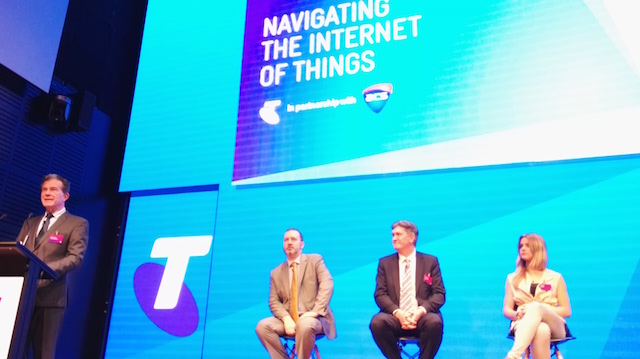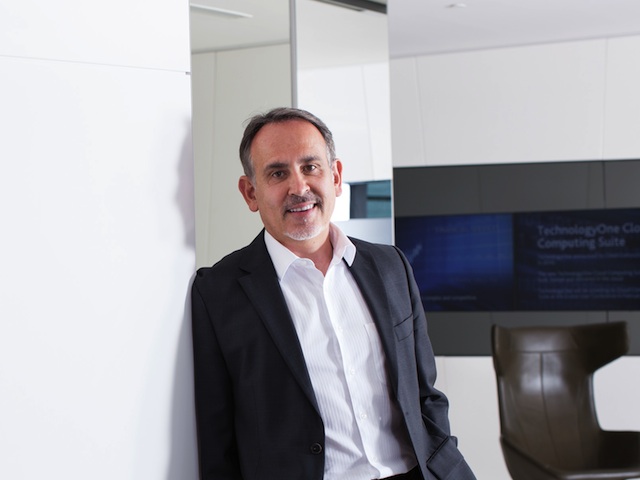“Consulting companies are a blight on our industry” declares Adrian DiMarco, CEO of Technology One.
A quick way to rile DiMarco is by asking him about IT outsourcing as I learned during an interview at Technology One’s annual Evolve conference on the Gold Coast last month.
The 1600 enterprise clients attending this year’s Evolve conference illustrate Technology One’s growth since it was founded in 1987 out of DiMarco’s frustration with the multinational outsourcing companies.
“I used to work for multinational technology companies and as a young person I really used to want to work for them, I found it very attractive and I expected they’d be very attractive and cutting edge.”
The reality DiMarco found was very different; “I worked for them for years and found the opposite, just how bad and inefficient they were.”
“I really didn’t like what I was working with, the software we were using and stuff and I thought we can do it much better here in Australia. The idea was to build enterprise software.”
Moving to the cloud
Having built that enterprise software company DiMarco now sees his Technology One’s future lying in cloud services and empahises the importance of learning from the industry’s leaders.
“We looked at companies like Google, Salesforce, Facebook and Dropbox. These companies are the undisputed leaders in the cloud.
“One thing that we noticed was that you can’t get Google, Salesforce, Facebook from a hosted provider; you can’t get it from IBM or Accenture.
“The leaders in the cloud build it themselves so they are deeply committed to it, they run the software for their customers and they invest millions of dollars each year in making the experience better.”
“It is clearly what the cloud has always meant to be.”
DiMarco though sees problems ahead as vendors look to rebrand their products and warns businesses need to be careful about cloud services.
“It is the next big goldrush in the IT industry. IT companies, particularly service companies have over the last few years seen revenues decline so in order to find new sources of growth they are all targeting the cloud.”
Accountability and the cloud
The lesson DiMarco learned in the early days of cloud computing was that accountability is necessary when you’re trusting services to other providers.
“We had early customers that went to the cloud; we said ‘look, it’s a great idea and we think it’s the future’. They wanted to go with hosting providers and we thought it was a sensible decision and we saw a train smash, it was a train smash of epic proportions”
“They were running data centres overseas in Europe that had latency issues, performance issues and the customers were paying money after money after money.”
“The customer was getting a terrible performance and there was no accountability.”
“We couldn’t fix it because we had lost control over the customers.”
This lack of accountability is one of the reason why so many IT projects fail DiMarco believes, citing the notorious Queensland Health payroll project.
“Queensland Health again used this fragmented model; the party that built the software, which is SAP, used a third party which was IBM to implement it which meant no accountablity.
:That would never have happened If SAP had signed the contract, if SAP had implemented the software, which they won’t do, they would have known the risks that were being taken and they would have stopped that project and fixed it up.??“That’s the difference between our model and the competitors model.”
“They take no responsibility, they implement these systems, they charge a fee-for-service and they have open ended contracts – that’s how they get to be a billion dollars – and do you know who suffers? It’s the customers.”
Shifting away from consultants
DiMarco sees governments moving away from the consultant driven model that’s proved so disappointing for agencies like Queensland Health which creates opportunities for Technology One and other Australian companies.
“For the last fifteen years we’ve not been able to sell software to the state government. It’s just changing, we’re getting in there now, but it was a terrible problem for us.”
The shift from big consultants is a view endorsed by Sugar CRM co-founder Clint Oram who described how the software business is changing when he spoke to Decoding the New Economy last week.
Oram sees the software market challenging established giants like SAP, Oracle and Microsoft; “in the past it was ‘here’s my software, goodbye and good luck. Maybe we’ll see you next year.”
“If you look at those names, the competitors we see on a day-to-day basis, several of them are very much challenged in making the shift from perpetual software licensing.” Oram says, “it’s been a challenge that I don’t think all of them will work their way through, their business models are too entrenched.”
“Software companies really have to stay focused on continuous innovation to their customers.”
DiMarco agrees with this view, citing the constant investment cloud computing companies make in their products as being one of the advantages in the business model.
Building the Australian software industry
For Australia to succeed in the software industry, DiMarco believes the nation has to encourage and celebrate the industry’s successes.
“It’s about getting people to believe in Australian software. I think the Aussie tech industry needs a lot more successes we can point to,” DiMarco observes. “I think that will create enthusiasm, excitement and a hub for the rest of the community to get around.”
“We gotta get some big scale companies with some high visibility and get them successful.”
For the future of Technology One, DiMarco sees international expansion as offering the best prospects with the company having recently announced a UK management team as part of its push into the British local government market.
Hopefully DiMarco’s UK management team won’t have to deal with the local management and IT consultants as they try to sell into British councils.
Similar posts:

